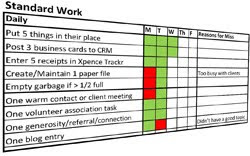The repeated hope was that after this event, they'd be organized. After this event, they'd somehow magically be inspired to stay on top of it; they'd magically become disciplined enough to keep it organized. Of course, the discipline was the hard part and nothing ever changed for the better.
Rather than trying to get organized, an interesting and effective alternative is to set yourself up to stay organized. When you think of the behaviours you'd do to stay organized, you'll see that they're not big events, they're little actions, done in predictable, standard ways.
 To stay organized, you put things in their standard places. To stay organized, you do tasks in the same standard way. You clean up after yourself. You do the small things the same way each time, every hour, every day. In Project Management vocabulary, this is the Work Breakdown Structure, chopping up big daunting tasks into small, achievable, reportable steps.
To stay organized, you put things in their standard places. To stay organized, you do tasks in the same standard way. You clean up after yourself. You do the small things the same way each time, every hour, every day. In Project Management vocabulary, this is the Work Breakdown Structure, chopping up big daunting tasks into small, achievable, reportable steps.So, as a start on the road to staying organized, don't rely on a To Do List or Checklist of big events, big projects you need to do. Instead, create a very small list of very small actions you will do every day that will lead you in the direction you want to go; a visual list of manageable daily standard work.
- Instead of "File all the old invoices", try "File one old invoice", every day.
- Instead of "Clean out the chemical storage area", try "Discard one outdated chemical", every day.
- Instead of "Create a tool storage system", try "Put two things in their place", every day.
- Instead of "Contact people I met at trade show", try "Phone one contact from the trade show", every day.
- Instead of "Write a book", try "Write one blog entry under 300 words", every day.
Make this list visual (Green and Red!). Post it somewhere. Ask an accountability partner to review it with you daily and help you address things that prevented you from completing "missed" activities.
You'll quickly make progress on the big projects, without ever doing a big project. And you'll have developed easy standard work habits that help you stay organized, which is way more satisfying and valuable than just getting organized.


No comments:
Post a Comment